人教版(2019)选择性必修 第一册 Unit 4 Body Language-Grammar(19张PPT)
文档属性
| 名称 | 人教版(2019)选择性必修 第一册 Unit 4 Body Language-Grammar(19张PPT) | 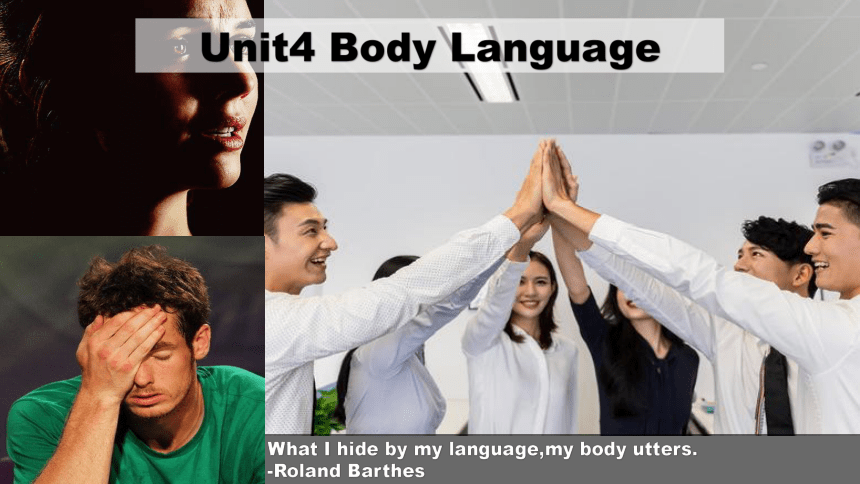 | |
| 格式 | zip | ||
| 文件大小 | 795.8KB | ||
| 资源类型 | 试卷 | ||
| 版本资源 | 人教版(2019) | ||
| 科目 | 英语 | ||
| 更新时间 | 2021-11-08 08:59:01 | ||
图片预览

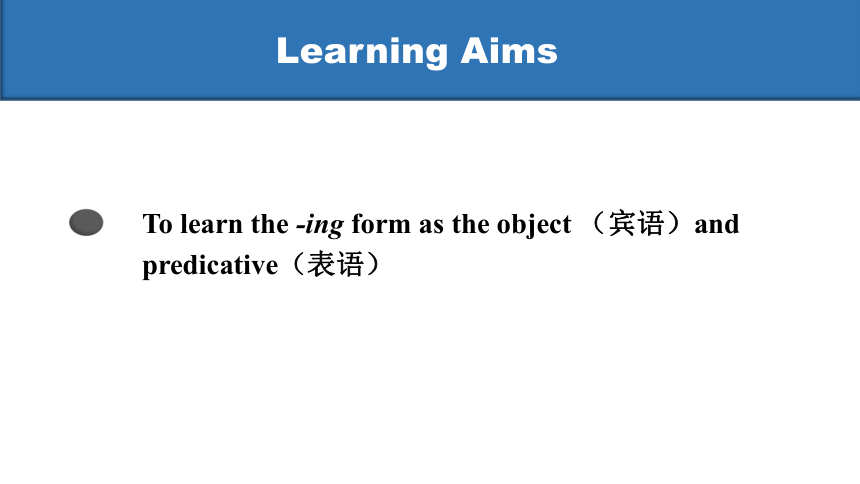
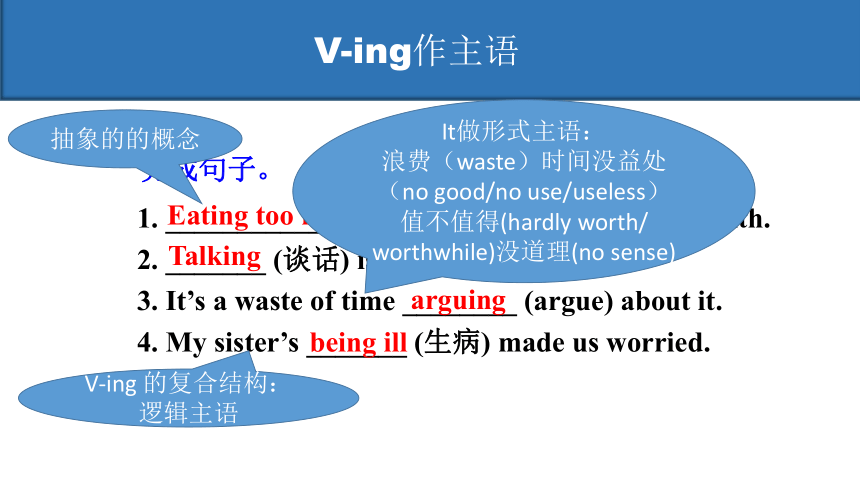
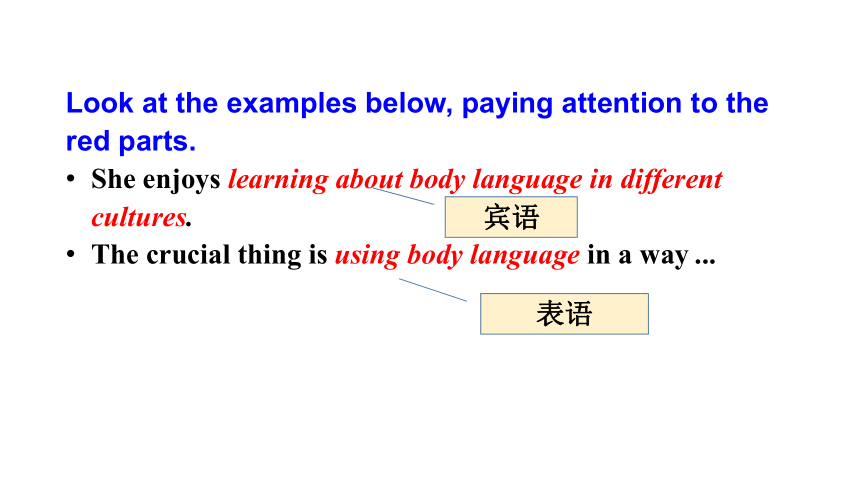
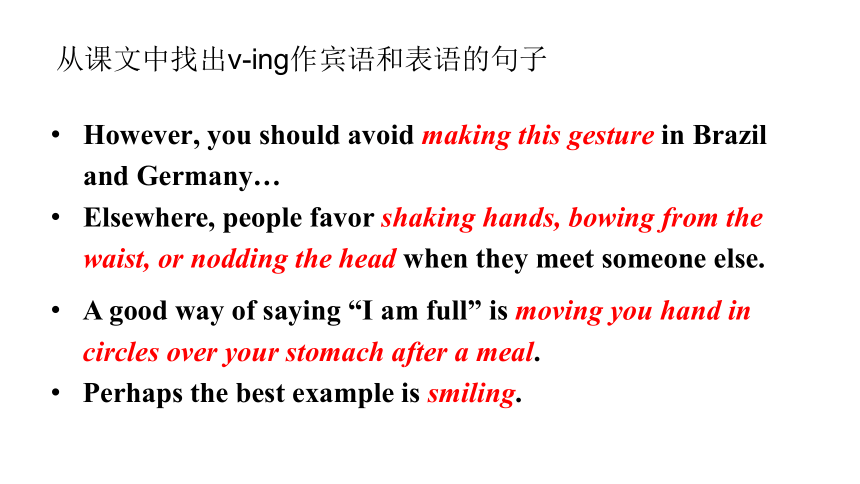
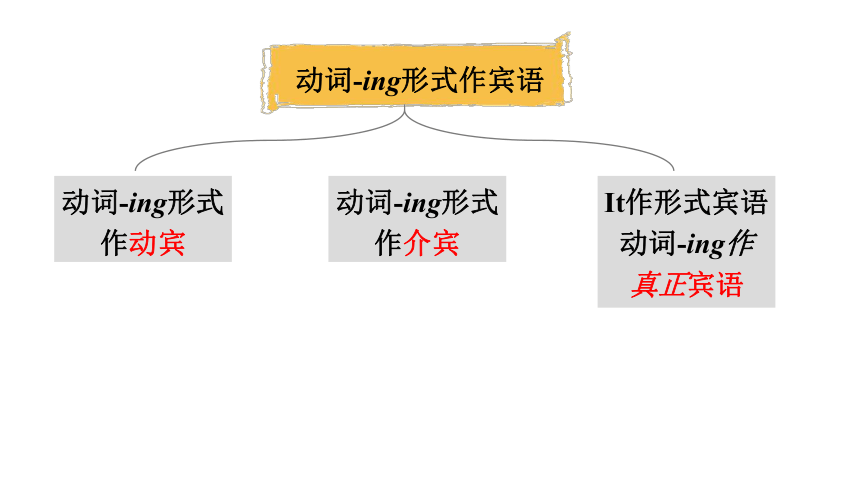
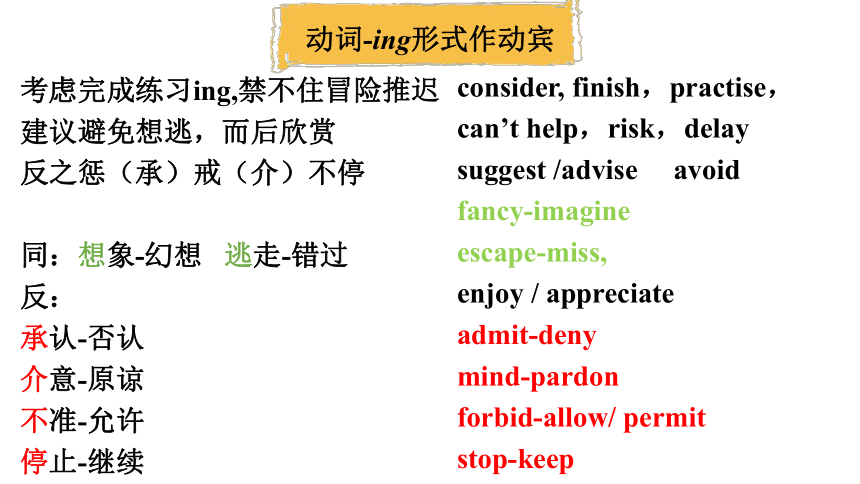
文档简介
(共19张PPT)
Unit4 Body Language
What I hide by my language,my body utters.
-Roland Barthes
Learning Aims
To learn the -ing form as the object (宾语)and predicative(表语)
1. _______________ (吃太多) is bad for your health.
2. _______ (谈话) is easier than doing.
3. It’s a waste of time ________ (argue) about it.
4. My sister’s _______ (生病) made us worried.
Eating too much
Talking
arguing
being ill
完成句子。
V-ing作主语
抽象的的概念
It做形式主语:
浪费(waste)时间没益处(no good/no use/useless)
值不值得(hardly worth/ worthwhile)没道理(no sense)
V-ing 的复合结构:逻辑主语
Look at the examples below, paying attention to the red parts.
She enjoys learning about body language in different cultures.
The crucial thing is using body language in a way ...
宾语
表语
从课文中找出v-ing作宾语和表语的句子
However, you should avoid making this gesture in Brazil and Germany…
Elsewhere, people favor shaking hands, bowing from the waist, or nodding the head when they meet someone else.
A good way of saying “I am full” is moving you hand in circles over your stomach after a meal.
Perhaps the best example is smiling.
动词-ing形式作宾语
动词-ing形式作动宾
动词-ing形式作介宾
It作形式宾语动词-ing作
真正宾语
动词-ing形式作动宾
consider, finish,practise,
can’t help,risk,delay
suggest /advise avoid
fancy-imagine
escape-miss,
enjoy / appreciate
admit-deny
mind-pardon
forbid-allow/ permit
stop-keep
考虑完成练习ing,禁不住冒险推迟
建议避免想逃,而后欣赏
反之惩(承)戒(介)不停
同:想象-幻想 逃走-错过
反:
承认-否认
介意-原谅
不准-允许
停止-继续
eg My mother advised asking a doctor to come and examine my eyes.
We’re considering paying a visit to the Science Museum.
You can’t avoid making a mistake.
动词-ing形式作介宾
介词+名词/v-ing/代词
注意:to作为介词的情况
to为介词ing
习(习惯)主(注意)席坚持毛(反手)泽东思想
期待为人民做贡献
习惯(be used to),注意(pay attention to),坚持(stick to),
反对(object to),着手做(get down to),
期待(look forward to), 贡献(devote to/contribute to),
2. 有些动词后既可跟动词-ing形式作宾语, 也可跟动词不定式作宾语, 但用法和意义都有所不同。这些动词有:begin, start, continue, like, love, prefer, mean, forget, remember, hate等。
A. 在like, love, hate, prefer等动词之后,动词-ing形式:泛指的动作;不定式:具体的一次性动作。
B. 在begin/start, continue之后,用动词-ing和不定式,意义无区别,尤其是当主语是人时。
C. 在forget, remember, regret之后,动词-ing:已经发生的动作;不定式:将要发生的动作。
eg I remember posting the letter.
I’ll remember to post the letter.
I shall never forget seeing the famous writer.
Don’t forget to write to your mother. (翻译)
我记得我已把信寄了。
我会记着去寄信的。
我永远不会忘记见到过那位著名作家。
不要忘了给你母亲写信。
go on doing 继续做原来做的事
go on to do 接着做另一件事
mean doing 意味着要做某事
mean to do 想要做某事
stop doing 停止做某事
stop to do 停下来(别的事)
D. 其他。对比分析:
try doing 试着做某事
try to do 努力做某事
be used to doing 习惯于做某事
be used to do 被用来做某事
can't help doing 禁不住做某事
can't help to do 不能帮助做某事
1) He stopped ________ (smoke) and have a rest. 2) He really must stop_________ (smoke).
3) I once tried ________ (learn) French.
4) Let’s try _________ (knock) at the back door.
5) I didn’t to mean ________ (hurt) your feeling.
6) This word means ________ (set) out at once.
to smoke
smoking
to learn
knocking
to hurt
setting
to learn
完成句子。
7) I can’t help ________ (clean) the room, for I am too busy.
8) After hearing the joke, we can’t help _________ (laugh).
9) Water is used to _______(water) flowers.
10) I am used to __________ (get up) early.
11) Though it rained, they went on _________ (work).
12) We have finished Part 1. Let’s go on _________ (learn) Part 2.
to clean
laughing
water
getting up
working
to learn
it做形式宾语
动词-ing形式作真正宾语
I found it no good_________(try)again.
I consider it useless________(cry)about it.
The professor think it worth________(read)the book.
浪费(waste)时间没益处(no good/no use/useless)
值不值得(hardly worth/ worthwhile)没道理(no sense)
trying
crying
reading
动词-ing形式用在动词need, want, require等后表示“需要”时, 主动形式表示被动意义。
eg The carpet really wants cleaning. =
The carpet really wants to be cleaned.
补充
1.动词-ing形式作表语,说明主语的内容,指抽象的、经常性的动作,此时主语与表语可以互换。
My hobby is growing flowers.
= Growing flowers is my hobby .
Her job is looking after the children.
= Looking after the children is her job.
动词-ing形式作表语
2.v-ing做表语,表示主语的状态,相当于一个形容词。
eg It’s amazing that you should know that!
—What do you think of the story I told you just now
—It sounds interesting. I like it very much.
Skiing is more exciting than skating.
Unit4 Body Language
What I hide by my language,my body utters.
-Roland Barthes
Learning Aims
To learn the -ing form as the object (宾语)and predicative(表语)
1. _______________ (吃太多) is bad for your health.
2. _______ (谈话) is easier than doing.
3. It’s a waste of time ________ (argue) about it.
4. My sister’s _______ (生病) made us worried.
Eating too much
Talking
arguing
being ill
完成句子。
V-ing作主语
抽象的的概念
It做形式主语:
浪费(waste)时间没益处(no good/no use/useless)
值不值得(hardly worth/ worthwhile)没道理(no sense)
V-ing 的复合结构:逻辑主语
Look at the examples below, paying attention to the red parts.
She enjoys learning about body language in different cultures.
The crucial thing is using body language in a way ...
宾语
表语
从课文中找出v-ing作宾语和表语的句子
However, you should avoid making this gesture in Brazil and Germany…
Elsewhere, people favor shaking hands, bowing from the waist, or nodding the head when they meet someone else.
A good way of saying “I am full” is moving you hand in circles over your stomach after a meal.
Perhaps the best example is smiling.
动词-ing形式作宾语
动词-ing形式作动宾
动词-ing形式作介宾
It作形式宾语动词-ing作
真正宾语
动词-ing形式作动宾
consider, finish,practise,
can’t help,risk,delay
suggest /advise avoid
fancy-imagine
escape-miss,
enjoy / appreciate
admit-deny
mind-pardon
forbid-allow/ permit
stop-keep
考虑完成练习ing,禁不住冒险推迟
建议避免想逃,而后欣赏
反之惩(承)戒(介)不停
同:想象-幻想 逃走-错过
反:
承认-否认
介意-原谅
不准-允许
停止-继续
eg My mother advised asking a doctor to come and examine my eyes.
We’re considering paying a visit to the Science Museum.
You can’t avoid making a mistake.
动词-ing形式作介宾
介词+名词/v-ing/代词
注意:to作为介词的情况
to为介词ing
习(习惯)主(注意)席坚持毛(反手)泽东思想
期待为人民做贡献
习惯(be used to),注意(pay attention to),坚持(stick to),
反对(object to),着手做(get down to),
期待(look forward to), 贡献(devote to/contribute to),
2. 有些动词后既可跟动词-ing形式作宾语, 也可跟动词不定式作宾语, 但用法和意义都有所不同。这些动词有:begin, start, continue, like, love, prefer, mean, forget, remember, hate等。
A. 在like, love, hate, prefer等动词之后,动词-ing形式:泛指的动作;不定式:具体的一次性动作。
B. 在begin/start, continue之后,用动词-ing和不定式,意义无区别,尤其是当主语是人时。
C. 在forget, remember, regret之后,动词-ing:已经发生的动作;不定式:将要发生的动作。
eg I remember posting the letter.
I’ll remember to post the letter.
I shall never forget seeing the famous writer.
Don’t forget to write to your mother. (翻译)
我记得我已把信寄了。
我会记着去寄信的。
我永远不会忘记见到过那位著名作家。
不要忘了给你母亲写信。
go on doing 继续做原来做的事
go on to do 接着做另一件事
mean doing 意味着要做某事
mean to do 想要做某事
stop doing 停止做某事
stop to do 停下来(别的事)
D. 其他。对比分析:
try doing 试着做某事
try to do 努力做某事
be used to doing 习惯于做某事
be used to do 被用来做某事
can't help doing 禁不住做某事
can't help to do 不能帮助做某事
1) He stopped ________ (smoke) and have a rest. 2) He really must stop_________ (smoke).
3) I once tried ________ (learn) French.
4) Let’s try _________ (knock) at the back door.
5) I didn’t to mean ________ (hurt) your feeling.
6) This word means ________ (set) out at once.
to smoke
smoking
to learn
knocking
to hurt
setting
to learn
完成句子。
7) I can’t help ________ (clean) the room, for I am too busy.
8) After hearing the joke, we can’t help _________ (laugh).
9) Water is used to _______(water) flowers.
10) I am used to __________ (get up) early.
11) Though it rained, they went on _________ (work).
12) We have finished Part 1. Let’s go on _________ (learn) Part 2.
to clean
laughing
water
getting up
working
to learn
it做形式宾语
动词-ing形式作真正宾语
I found it no good_________(try)again.
I consider it useless________(cry)about it.
The professor think it worth________(read)the book.
浪费(waste)时间没益处(no good/no use/useless)
值不值得(hardly worth/ worthwhile)没道理(no sense)
trying
crying
reading
动词-ing形式用在动词need, want, require等后表示“需要”时, 主动形式表示被动意义。
eg The carpet really wants cleaning. =
The carpet really wants to be cleaned.
补充
1.动词-ing形式作表语,说明主语的内容,指抽象的、经常性的动作,此时主语与表语可以互换。
My hobby is growing flowers.
= Growing flowers is my hobby .
Her job is looking after the children.
= Looking after the children is her job.
动词-ing形式作表语
2.v-ing做表语,表示主语的状态,相当于一个形容词。
eg It’s amazing that you should know that!
—What do you think of the story I told you just now
—It sounds interesting. I like it very much.
Skiing is more exciting than skating.
